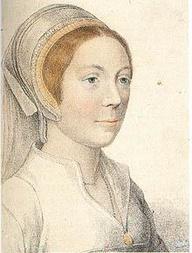 On this day in history, Sunday 6th November 1541, four days after allegations had been made regarding her sexual history, Queen Catherine Howard, Henry VIII’s fifth wife, was abandoned by her husband at Hampton Court Palace.
On this day in history, Sunday 6th November 1541, four days after allegations had been made regarding her sexual history, Queen Catherine Howard, Henry VIII’s fifth wife, was abandoned by her husband at Hampton Court Palace.
While the king and queen had been on their royal progress to the north of England, a man named John Lassells informed members of the king’s council that his sister had told him things about Catherine’s past that they needed to know. John’s sister, Mary Hall, had been a member of the Dowager Duchess of Norfolk’s household with Catherine and she knew Catherine to be “light, both in living and conditions”. Mary explained that Catherine’s music teacher, Henry Manox, “knew a privy mark on her body” and that “one Fras. Derham had lain in bed[with her, in his doublet] and hose, between the sheets an hundr[ed nights]”. Archbishop Thomas Cranmer passed this information on to the king in a letter on 2nd November 1541, and the king ordered an investigation to be launched.
Lassells and Mary both confirmed their stories and Manox confessed to a romance with Catherine, although it did not go as far as the couple sleeping together. Francis Dereham, a man who was now in the queen’s service, confessed to knowing Catherine “carnally many times”, and Catherine also confessed to her and Dereham having carnal knowledge of each other. The queen had not been a virgin when she married the king, and worse, her ex-lover was in her household.
On 6th November, the king “dined at a little place in the fields” near Hampton Court, “on pretext of hunting”, and then left the palace, abandoning his wife in her chambers there, to meet with his council in London. The council meeting went on from midnight “until 4 or 5 a.m. on Monday”. There was much to discuss. The queen would never see her husband again.
Notes and Sources
- Letters and Papers, Foreign and Domestic, Henry VIII, Volume 16, 1540-1541, ed. James Gairdner and R H Brodie (London, 1898), pp. 613-629, 1332 and 1334.
- SP (State Papers, Henry VIII) 1/167, f. 136v.; Russell, Gareth (2017) Young and Damned and Fair, William Collins.